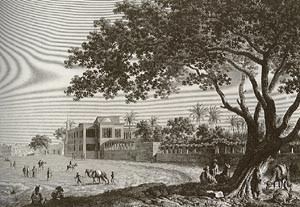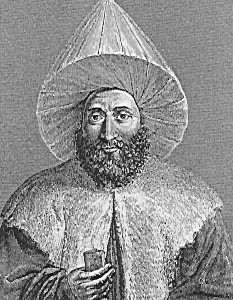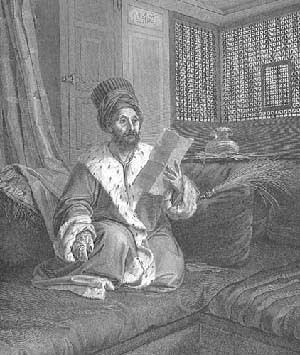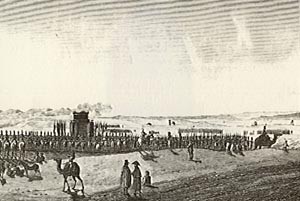At sunrise, a salvo of three shots per gun was fired by all the artillery in the city and in the surrounding forts so as to announce the fête. At the same time, drummers beat the call-to-arms at Boulac, and old and greater Cairo. The troops of all battalions who were in those garrisons then set out for the huge area between the Ibrahim-Bey hospital and the fort of the Institute.
 At seven o'clock in the morning, all the principal officers, the Agha of the Janissaries, the Divan, the chiefs of the law and the Pasha Hussein-Mustapha (taken prisoner at the battle of Aboukir) met at Chief of Staff Kléber's house.
At seven o'clock in the morning, all the principal officers, the Agha of the Janissaries, the Divan, the chiefs of the law and the Pasha Hussein-Mustapha (taken prisoner at the battle of Aboukir) met at Chief of Staff Kléber's house.
 They were received in apartments lit with gentle lighting but recently decorated in a stylish but severe manner. Elegant draperies and battle trophies formed the principal ornament.
They were received in apartments lit with gentle lighting but recently decorated in a stylish but severe manner. Elegant draperies and battle trophies formed the principal ornament.
Before leaving to attend the fête the chief of staff gave opulent cloaks to the Agha of the Janisseries, the President of the Divan, and the Qady. He said to the first “Receive this cloak as a proof of my trust and as a sign of the authority which I wish you to wield. With you awake, I may sleep sound”. He said to the President of the Divan “Never forget that the body of which you are the head was formed to assist with its wisdom and counsel the authorities. It was formed to predict and prevent the excess of passions which leads to crime. But with all that, it is only those who are the upholders of the law who must deal out punishment”. Finally, he said to the Qadi, “Minister of Justice, administer it impartially for all men, who are all equal before the law, and bless through the equity of your judgements the French government, to which you are beholden by solemn oaths”.
 The commander-in-chief then gave various presents to the principal Sheikhs, and the whole cortege (preceded and followed by a cavalry detachment mixed with musicians) set out for the plain on the eastern bank of the Nile near the farm of Ibrâhym-Bey and the fort of the Institut.
The commander-in-chief then gave various presents to the principal Sheikhs, and the whole cortege (preceded and followed by a cavalry detachment mixed with musicians) set out for the plain on the eastern bank of the Nile near the farm of Ibrâhym-Bey and the fort of the Institut.
The infantry formed the two sides of a large square, and the apex which was opposite the point where everyone entered was closed off by the artillery, the dromedary regiment, the regiment of Hussars, Chasseurs and Dragoons; indeed the ensemble provided an imposing sight.
The heights which lay between the plain and the town were crowned with infantry troops and they acted as a backdrop to the huge tableau.
The commander-in-chief then reviewed the entire army, which he found in good condition, and then came with his escort to take his place on an earth mound in the centre of the square, and from here he pronounced the following speech:
SOLDIERS,
This is the end of the seventh year since that memorable time when the French people finally broke the chains of slavery, abolishing the Royalty, and established for itself a Republican government.
You have supported the Republic and you have defended it with your bravery. To the North, South, East and West you have increased the frontiers of France. And her enemies who, in a fit of pride, had already divided up our provinces soon had to calculate to their dismay how far you might advance.
But your banners, my brave companions in arms, are bent beneath the weight of victor's laurels. Such great work demands an end and such glory has its prize. One more effort and you shall have both. Very soon you shall bring lasting peace to the world, as soon as you have conquered it.
When the commander-in-chief ceased speaking, all of a sudden shouts broke out all over 'Long live the Republic'!. And these shouts were matched by artillery salvoes and musket fire from the whole army.
After some precision manoeuvres had taken place, the infantry began to parade in excellent order. This was followed by the Dromedary regiment, which in turn was in turn itself followed by the artillery and then the cavalry. Indeed the cavalry rode past at a trot with its artillery pieces in tow. And in a brilliant and perfectly executed figure, they set up in battle order with the artillery in the centre opposite the mound on which stood the commander-in-chief, all the Turkish sheiks and the Pasha, who was particularly impressed by the manoeuvres and the good order of the troops. Once the final line had been formed the cavalry artillery fired a salvo with every gun to mark the end of the manoeuvres.
Everyone returned in the same order in which they arrived, crossing much of the city in order to reach the commander-in-chief's house. After dispersing until four o'clock in the afternoon, they gathered once again at the house for the meal.
The vaulted terrace above the garden in the commander-in-chief's house which gives onto Ezbékyéh square had been chosen as the site for the fête. The terrace was decorated with columns and trophies, and the pillars and trellises were covered with elegant draperies. A table laid for two-hundred was set upon the terrace and at either end there were two orchestras which played music in turns, performing symphonies and other pieces throughout the whole of the dinner. At the end of the meal – which was sumptuous, fitting and without disturbance – the commander-in-chief stood up and gave the following toast: “To the prosperity of the Republic and to the glory of her soldiers!”
Night was approaching and the turks (who generally go to bed early) were only restrained by the promise of a firework display, to be executed on the designs and under the orders of the Brigadier chief of artillery, Grosbert.
The setting for the display – which was a great success – was arranged upon an earth levée which had been heaped up in the centre of the Exbékyéh square after the flooding.
The setting represented a triumphal bridge whose piles had been revealed by the dropping of the water level. The revetment of the roads was cut as steps for use in a fête. Obelisks decked with oak and olive branches were erected in-between the arches. Above the central arch there was a statute representing Europe. Above was written 'The Taking of Malta'. Asia and Africa stood above the side arches. The inscription under the first recalled the Battle of Mount Tabor; under the statue of Africa was written 'The Battle of Aboukir'.
For it was in these three parts of the world that the Armée d'Orient distinguished itself.
On the four pillars of the bridge there were the following inscriptions:
Anniversary of the French Republic
The Fatherland is watching over us
Courage has won us liberty
Soldiers, defend what you have created
Various fireworks were set on boats and on the islands which the flooding had left uncovered. The artillery fired in the intervals. A shower of 3,000 rockets let off from two points brought the show to an end.
The town was completely and excellently illuminated. The inhabitants of Cairo had never before taken such an active part in our fêtes.
The Moslems who had spent the day either with the commander-in-chief or in his suite retired after the firework display. The seriousness of their mien had slightly dampened the national ardour. So to conmpensate for this the fête ended with a sort of improvised ball, of which the French ladies who had come with the army, those who were living there before, and the ladies of other European nations (all lumped under the name Franks) were the ornament and principal part.
Banquet in celebration of success in Egypt given in honour of Moreau and Bonaparte in Paris
Extract from the Gazette Nationale ou Le Moniteur Universel N° 47, septidi 17 brumaire an 8 (i.e., 8 November 1799)
15 brumaire an 8 (i.e., 6 November 1799)
Fête given by the representatives of the people for Bonaparte and Moreau was exceedingly brilliant. The Temple of Victory (previously the Church of St-Sulpice) where the ceremony took place was magnificently decorated, hung with beatiful tapestries and numerous standards taken from the Republic's various enemies. There were no women or spectators. There were about 750 people at dinner.
The president of the anciens sat at the head of the table. In the middle to the right sat the president of the Directoire. To the left of him sat General Moreau. Next there was the president of the Cinq-Cents, then Bonaparte.
The toasts were as follows:
President of the anciens – To the French Republic
President of the Cinq-Cents – To the army and the navy
President of the Directoire – To peace
Bonaparte – To the union of all the French
The banquet began at six o'clock and was held in high order. At the end of the temple, over what used to be the high altar, there was written in-between the trophies 'Be united; you will be victors'. Excellent music was played: the organ, which was still in the temple, was played by Couperin.
Bibliography
Pièces diverses et correspondance relatives aux opérations de l'armée d'Orient en Egypte.
Imprimée en exécution de l'arrêté du TRIBUNAT, en date du 7 Nivose an 9 de la République française.
Paris, Baudouin…Messidor an IX.


